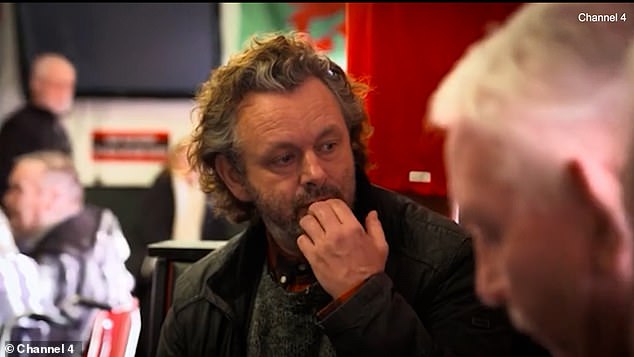Michael Sheen and Channel 4 have become embroiled in a legal row amid claims ideas for the actor’s recent debt documentary were ‘copied’.
A team of independent TV producers have hit out over the Welsh star’s programme, ‘Michael Sheen’s Secret Million Pound Giveaway’, which they claim bears a striking resemblance to a rejected documentary they pitched to the star years earlier.
Lawyers representing film-makers Daniel Edelstyn and Hilary Powell have written to Sheen and the team behind his documentary, claiming it appears similar to the duo’s own 2021 project, ‘Bank Job’.
Edelstyn and Powell had allegedly been in contact with the Hollywood A-lister’s people between 2017 and 2020 and had tried to get him to join their show, which was unsuccessfully pitched to a trio of Channel 4 commissioners.
But the pair – who spent their life savings developing the programme – were stunned when they saw Sheen’s documentary air three weeks ago, reports the Guardian, and have now ‘questioned the originality’ of it.
TV producers behind Sheen’s show insist it was ‘independently developed’ and Channel 4 claimed it was ‘ludicrous’ to suggest the actor’s programme was a ‘copy’ of Bank Job. Sheen’s team added he was ‘regularly pitched’ documentary ideas but ‘only commits to ones he believes in’.
Despite being rejected by TV, Bank Job was still filmed and shown in independent cinemas in 2021. In it, producers used a team of finance experts to identify £1million of high-interest debt owed by people in Walthamstow, east London.
Financial rules means that large debts which are unlikely to ever be paid off in full can be bought and settled for a reduced amount. The film-makers behind Bank Job reportedly took advantage of this loophole to ‘destroy predatory debt’.
They raised £40,000 for the show. Half was used to buy a portfolio, effectively wiping it and then bought and blew up a van to mark the debt being cleared. The other £20,000 was donated to a food bank, homeless kitchen, youth project and school.

Michael Sheen (pictured) and Channel 4 have become embroiled in a legal row amid claims ideas for the actor’s recent debt documentary were ‘copied’

Lawyers representing film-makers Daniel Edelstyn and Hilary Powell (pictured) have written to Sheen and the team behind his documentary, saying it appears similar to the duo’s 2021 project, ‘Bank Job’
However, Sheen’s documentary centred on slashing debt owed by people in his hometown of Port Talbot. The 56-year-old Frost/Nixon star pumped in £100,000 of his own cash to buy the debt and wipe it.
Fans later hailed him as a ‘man of the people’ helped to clear £1million of debt for 900 people.
However, lawyers representing Edelstyn and Powell, and production company Optimistic, claimed Bank Job had been the ‘first time’ an action to wipe debt in this way had been carried out by a UK TV show.
‘It is difficult for our client not to conclude that its ideas have been used without its permission or, at the very least, cursory credit,’ the letter by entertainment legal firm Russells said, reported the Guardian.
Edelstyn and Powell reportedly claim the idea for their documentary first arose in 2014 before they then approached Sheen – who is also a social justice activist – with their project, three years later.
Sheen’s team allegedly responded at the time saying they were ‘working on a big debt project’ and were potentially interested in the duo’s pitch.
Communications reportedly continued between the actor’s people and Optimistic up until June 2020. Bank Job premiered in May 2021. Production company Full Fat TV pitched their debt documentary idea in June 2021, lawyers for Optimistic said.
In a statement, Full Fat TV insisted their company had ‘independently developed and pitched’ the show to Sheen and Channel 4 and that it was a ‘shame that an important message about unfairness in the credit system… risks being lost due to these unfounded claims’.

Sheen used £100,000 of his own money to produce his documentary, which aired last month

Sheen is pictured in his Channel 4 documentary ‘Michael Sheen’s Million Pound Giveaway’
Channel 4 claims the commissioner who green-lit Michael Sheen’s Million Pound Giveaway had been unaware of any pitch by the team behind Bank Job.
‘These two programmes are significantly different and it’s ludicrous to suggest that one is a copy of the other,’ a spokesman for the broadcaster told MailOnline:
‘Buying and writing off debt is an established practice which has been covered in the media on multiple occasions and the commissioner who greenlit and worked on Michael Sheen’s Million Pound giveaway had no awareness of Bank Job.’
In a statement, a representative for Sheen said he had ‘long campaigned about debt inequality’ and that he took ‘enormous personal and financial risk’ by pumping £100,000 of his own cash into it.
A spokesperson for Sheen told MailOnline: ‘Michael has said many times that the inspiration for him doing something like this came from watching John Oliver buying medical bill debt in the US in 2016. Michael has long campaigned about debt inequality, which is why Full Fat TV came to him with their ambitious proposal.
‘They asked Michael to author a campaigning film to drive change in the debt and credit buying industry and to spend £100,000 of his own money to write off debt of people in his local community.
‘The production company had to demonstrate to Michael how that could be done and, once satisfied, Michael took an enormous personal and financial risk – pledging £100,000 of his own money. Michael was not paid for making the documentary. Michael is regularly pitched documentary ideas but only commits to the ones he really believes in.’
Speaking about his documentary on the One Show last month, the actor added: ‘I didn’t have £100,000 to throw around so I wanted it to be effective but when I realised that I could do this, that I could [get] £1million worth of people’s debt and just write it off, it seemed like a good thing to do.
‘People’s debt gets put into bundles and then debt buying companies can buy those bundles and then they can sell it on to another debt buying company at a lower price.
‘So the debt itself, even though the amount of people who owe is still the same, the people who own the debt can sell it for less and less money.’







